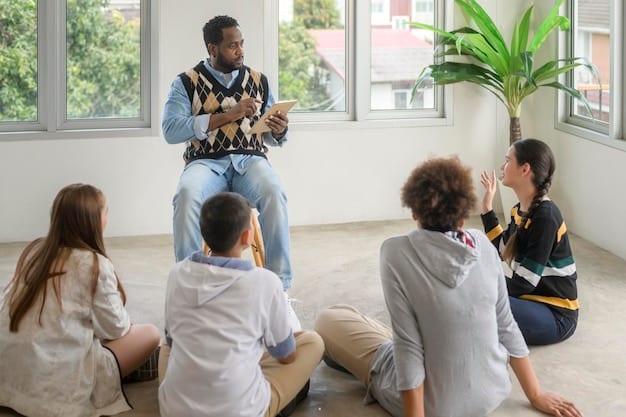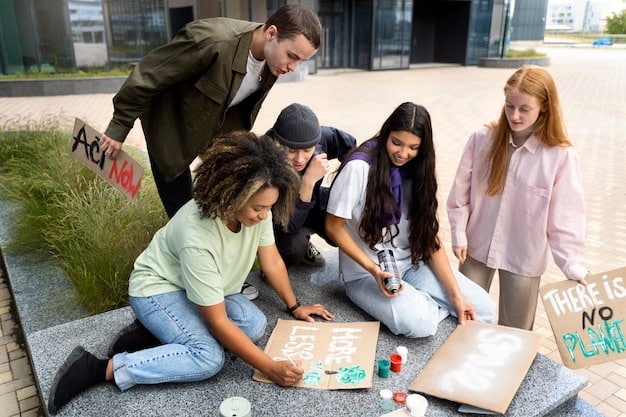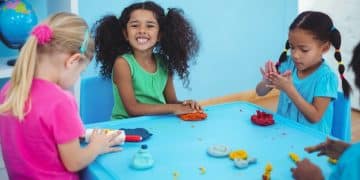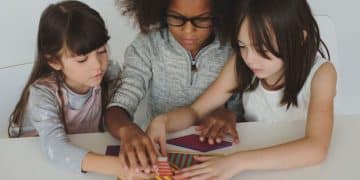SEL in Education: Building Essential Life Skills for Future Success

Anúncios
Social-emotional learning (SEL) in education is crucial for equipping students with vital life skills, fostering their ability to understand and manage emotions, achieve positive goals, show empathy, build strong relationships, and make responsible decisions, ultimately contributing to academic success and overall well-being.
Anúncios
In an increasingly complex world, traditional academic learning, while foundational, is no longer sufficient to fully prepare students for the demands of life, work, and engaged citizenship. The growing emphasis on The Importance of Social-Emotional Learning (SEL) in Education: Building Essential Life Skills underscores a crucial shift towards a holistic approach that recognizes emotional intelligence and interpersonal skills as pillars of success, well-being, and societal contribution.
Understanding Social-Emotional Learning (SEL)
Social-emotional learning (SEL) encompasses a broad range of abilities that are vital for navigating the world effectively. It’s not just about being “nice” or “well-behaved”; it’s about developing a profound understanding of oneself and others, and using that understanding to make constructive choices. This foundation allows individuals to manage their emotions, achieve personal and collective goals, feel and show empathy for others, establish and maintain supportive relationships, and make responsible, ethical decisions.
The Collaborative for Academic, Social, and Emotional Learning (CASEL), a leading organization in the field, identifies five core competencies of SEL. These competencies provide a structured framework for educators and parents to integrate SEL into daily routines and curriculum. They are interconnected and mutually reinforcing, meaning that progress in one area often supports development in others. This integrated approach ensures that students are equipped with a robust toolkit for life’s challenges and opportunities.
Anúncios
The Five Core Competencies of SEL
Understanding these five core areas is fundamental to appreciating the comprehensive nature of SEL. Each component plays a unique yet complementary role in fostering well-rounded individuals.
- Self-Awareness: The ability to accurately recognize one’s own emotions, thoughts, and values and how they influence behavior. This includes identifying strengths and challenges, and developing a realistic self-perception.
- Self-Management: The ability to regulate one’s emotions, thoughts, and behaviors effectively in different situations. This involves managing stress, controlling impulses, motivating oneself, and setting and working towards personal and academic goals.
- Social Awareness: The ability to take the perspective of and empathize with others, including those from diverse backgrounds and cultures. It involves understanding social and ethical norms for behavior and recognizing family, school, and community resources and supports.
- Relationship Skills: The ability to establish and maintain healthy and rewarding relationships with diverse individuals and groups. This includes communicating clearly, listening actively, cooperating, resisting inappropriate social pressure, negotiating conflict constructively, and seeking and offering help when needed.
- Responsible Decision-Making: The ability to make constructive choices about personal behavior and social interactions across diverse situations. This involves considering ethical standards, safety concerns, realistic evaluations of consequences, and the well-being of self and others.
Introducing SEL into the educational landscape fundamentally changes how learning is perceived. It moves beyond rote memorization and factual recall, emphasizing the development of human capabilities that are increasingly valued in the 21st century. By intentionally cultivating these social-emotional skills, educational institutions are not just teaching subjects; they are nurturing adaptable, resilient, and compassionate citizens. Moreover, integrating SEL helps create a positive school climate where students feel safe, supported, and engaged, fostering conditions conducive to deeper learning and personal growth.

SEL’s Impact on Academic Achievement
While often seen as separate from “academics,” evidence overwhelmingly demonstrates that social-emotional learning profoundly enhances academic performance. When students possess strong social-emotional skills, they are better equipped to handle the cognitive and emotional demands of learning. They can focus more effectively, persist through challenges, and engage more deeply with complex material. This connection underscores that a student’s emotional state and interpersonal abilities are not merely auxiliary to learning, but absolutely central to it.
Students with developed self-management skills, for instance, are better at organizing their time, setting academic goals, and following through on assignments. They are also more likely to display resilience when faced with frustration or failure, viewing setbacks as opportunities for growth rather than insurmountable obstacles. This internal motivation and self-regulation directly translate into improved grades and stronger problem-solving abilities across all subjects.
Improved Classroom Behavior and Engagement
SEL also plays a critical role in fostering a positive and productive classroom environment. When students understand how to manage their emotions and interact respectfully with peers and teachers, incidents of disruption decrease significantly. This creates more instructional time and a safer, more predictable learning space where all students can thrive. It’s a symbiotic relationship: a positive environment supports SEL, which in turn maintains that environment.
Furthermore, strong social awareness and relationship skills enable students to collaborate effectively on group projects, participate meaningfully in class discussions, and seek help when needed. These cooperative and communicative behaviors are essential for modern pedagogical approaches that emphasize active learning, critical thinking, and peer-to-peer instruction. Engagement levels rise as students feel more connected, understood, and capable within their learning community.
Research, including meta-analyses of SEL programs, consistently shows a positive correlation between SEL interventions and academic outcomes. Studies indicate that students participating in SEL programs demonstrate significant gains in academic performance, better attitudes toward school, and fewer conduct problems. This evidence provides compelling justification for integrating SEL not as a supplement, but as an integral component of comprehensive education that aims to cultivate both intellectual prowess and essential life skills for future success.
Fostering Mental Health and Well-being through SEL
Beyond academic gains, one of the most critical benefits of social-emotional learning is its profound impact on student mental health and overall well-being. In an era where mental health challenges among young people are increasingly prevalent, SEL provides foundational tools that help students cope with stress, manage anxiety, and develop emotional resilience. It equips them with the internal resources to navigate adolescence and adulthood with greater confidence and stability.
By explicitly teaching self-awareness and self-management, SEL programs encourage students to recognize and understand their emotional states. This awareness is the first step towards healthy emotional regulation, enabling students to identify feelings like anxiety or sadness and apply constructive coping strategies, rather than internalizing or reacting impulsively. This proactive approach to emotional health can reduce the likelihood of developing more severe mental health issues later in life.
Building Resilience and Coping Mechanisms
Life is full of challenges, and SEL provides students with a robust toolkit for facing adversity. Through deliberate practice in problem-solving and responsible decision-making, students learn to evaluate situations, consider consequences, and proactively develop solutions. This cultivates resilience, the ability to bounce back from difficult experiences, rather than being overwhelmed by them. It’s about teaching students that while they can’t control every circumstance, they can control their reactions and their path forward.
- Stress Reduction: SEL techniques, such as mindfulness and emotional regulation strategies, directly help students manage academic pressure, social anxieties, and personal stressors.
- Empathy and Connection: Developing social awareness and relationship skills reduces feelings of isolation and fosters a sense of belonging, which is a key protective factor against depression and anxiety.
- Bullying Prevention: SEL promotes pro-social behaviors and empathy, making students less likely to engage in bullying and more likely to intervene or seek help when they witness it.
- Positive Self-Concept: Recognizing one’s strengths and managing challenges constructively builds self-esteem and a positive self-image, crucial components of mental well-being.
The integration of SEL into the curriculum is not just a reactive measure to address growing mental health crises; it is a proactive investment in the holistic health of the next generation. By teaching students to understand and manage their emotions, build positive relationships, and make responsible choices, schools are empowering them to lead healthier, more fulfilling lives. This long-term impact extends far beyond the classroom, influencing their personal relationships, career trajectories, and overall life satisfaction.
Enhancing Relationships and Community Building
A cornerstone of social-emotional learning is its profound capacity for enhancing interpersonal relationships and fostering a strong sense of community within schools and beyond. Humans are inherently social beings, and our ability to connect, communicate, and collaborate effectively is paramount to our success and happiness. SEL directly addresses these needs, equipping students with the skills necessary to navigate complex social dynamics and build a supportive network.
Relationship skills, one of CASEL’s core competencies, are central to this aspect. Students learn active listening, effective communication, conflict resolution, and the importance of healthy boundaries. These are not merely soft skills; they are vital tools for building trust, mutual respect, and understanding, irrespective of differences. When young people master these abilities, they are better able to form meaningful friendships, collaborate on projects, and resolve disagreements constructively, both in and out of the classroom.
Fostering Empathy and Inclusivity
SEL promotes social awareness, which involves understanding and empathizing with others’ perspectives, feelings, and experiences, especially those from diverse backgrounds. This cultivates a culture of inclusivity and compassion. When students are encouraged to “step into someone else’s shoes,” they develop a broader worldview, challenge biases, and learn to appreciate the richness that diversity brings. This is critical in preparing them for a globalized world that demands cross-cultural understanding and cooperation.
Moreover, the emphasis on responsible decision-making extends to how students interact within their community. They learn to consider the ethical implications of their actions and how their choices impact others. This fosters a sense of collective responsibility and encourages pro-social behaviors such as helping, sharing, and advocating for justice. A school community where these principles are actively practiced becomes a safer, more welcoming, and more productive environment for everyone.
Building strong relationships and a sense of community through SEL also contributes to reduced bullying, increased student attendance, and greater civic engagement. When students feel valued and connected, they are more likely to participate, take risks in their learning, and contribute positively to their surroundings. This goes beyond mere coexistence; it’s about active collaboration and the creation of a supportive ecosystem where individuals can flourish and contribute their unique talents to the collective good. Ultimately, SEL lays the groundwork for creating empathetic, responsible, and engaged citizens who can build a more harmonious society.

Integrating SEL into the Curriculum and School Culture
The successful implementation of social-emotional learning requires more than just isolated lessons; it demands a systemic integration into the entire fabric of the school, from curriculum design to classroom management and school-wide culture. This holistic approach ensures that SEL is not seen as an add-on but as an essential component of every student’s educational experience. It impacts how teachers teach, how administrators lead, and how students interact with each other and with learning material.
One key strategy is to embed SEL competencies directly into academic subjects. For example, in a history class, students can analyze historical events through the lens of social awareness, understanding the perspectives of different groups. In a science class, collaborative projects can foster relationship skills and responsible decision-making as students work together to solve problems. This approach makes SEL concepts relevant and applicable to real-world learning.
Teacher Training and Professional Development
Teachers are at the forefront of SEL implementation, and adequate training is crucial for their success. Educators need to understand not only what SEL is but also how to model SEL competencies themselves and how to integrate them effectively into their daily teaching practices. Professional development should cover:
- Effective strategies for teaching self-awareness and self-management.
- Techniques for fostering empathy and social awareness in students.
- How to facilitate conflict resolution and build strong relationship skills.
- Methods for guiding students in responsible decision-making.
- Creating a classroom climate that supports emotional safety and learning.
Beyond classroom instruction, SEL must permeate the entire school culture. This means promoting positive norms, implementing restorative justice practices, and fostering a sense of psychological safety where students feel comfortable expressing emotions and making mistakes. School leaders play a vital role in modeling SEL principles and creating an environment where both staff and students feel supported, respected, and valued. This consistent reinforcement across all aspects of school life helps to solidify SEL principles in students’ minds and behaviors.
Furthermore, parent and community engagement is essential for reinforcing SEL outside of school hours. When families and schools work together to reinforce these skills, students receive consistent messaging and support, which amplifies the positive impact. This comprehensive, integrated approach ensures that SEL becomes an inherent part of the educational journey, preparing students not just for academic success, but for thriving in all aspects of their lives.
The Long-Term Benefits of SEL for Life and Career
The benefits of social-emotional learning extend far beyond the classroom, equipping individuals with a durable suite of skills that are invaluable throughout their lives and careers. In an increasingly dynamic and interconnected world, the ability to adapt, collaborate, and manage oneself emotionally is as critical, if not more, than technical expertise. SEL provides the foundational scaffolding upon which a resilient and successful life can be built.
Employers consistently highlight the importance of “soft skills” or “power skills”—which align directly with SEL competencies—over purely technical knowledge. Qualities like effective communication, teamwork, problem-solving, leadership, and emotional regulation are what differentiate high-performing individuals and teams. Graduates with strong SEL skills are better prepared for the demands of the modern workforce, capable of navigating complex organizational structures, managing difficult conversations, and innovating collaboratively.
Enhanced Well-being and Civic Engagement
Beyond professional life, SEL contributes significantly to an individual’s overall well-being. People with developed social-emotional skills tend to have stronger, more fulfilling personal relationships, are better equipped to handle life’s inevitable stresses, and exhibit greater overall life satisfaction. They possess the emotional resilience to navigate relationship challenges, career transitions, and personal hardships, leading to a more stable and contented existence.
Moreover, SEL fosters active and responsible citizenship. Individuals who understand their own values, empathize with others, and can make responsible decisions are more likely to engage positively in their communities. They are better equipped to advocate for social justice, participate in democratic processes, and contribute to the collective good. This broader civic participation strengthens communities and societies as a whole, addressing challenges collaboratively and building a more equitable future.
- Career Readiness: Employers prioritize candidates with strong collaboration, communication, and adaptability skills, all cultivated through SEL.
- Effective Leadership: Self-awareness, empathy, and responsible decision-making are hallmarks of effective leaders in any field.
- Reduced Risky Behaviors: Strong self-management and decision-making skills learned through SEL can lead to fewer instances of substance abuse, violence, or other risky behaviors.
- Lifelong Learning: The resilience and self-motivation fostered by SEL encourage individuals to embrace continuous learning and personal growth throughout their lives.
Ultimately, investing in SEL is an investment in human flourishing. It’s about preparing students not just for exams or specific jobs, but for a lifetime of learning, personal growth, positive relationships, and meaningful contributions to society. The skills fostered by SEL are universal, enduring, and indispensable for navigating the complexities of the 21st century and beyond.
| Key Aspect | Brief Description |
|---|---|
| 🧠 Improved Academics | SEL boosts focus, persistence, and problem-solving, directly leading to better academic outcomes and engagement. |
| ❤️ Mental Well-being | Develops stress coping, emotional regulation, and resilience, crucial for managing anxiety and building a positive self-concept. |
| 🤝 Stronger Relationships | Cultivates empathy, communication, and conflict resolution, fostering healthy peer and community interactions. |
| 🚀 Life & Career Success | Equips individuals with essential “power skills” like adaptability, teamwork, and leadership, vital for future careers and civic engagement. |
Frequently Asked Questions About Social-Emotional Learning (SEL)
Social-emotional learning (SEL) broadly refers to the process through which individuals acquire and apply the knowledge, attitudes, and skills necessary to understand and manage emotions, set and achieve positive goals, feel and show empathy for others, establish and maintain positive relationships, and make responsible decisions. It’s a holistic approach to personal and social development.
SEL significantly boosts academic achievement by enhancing students’ focus, self-management, and problem-solving abilities. Students with strong SEL skills are better able to regulate their emotions, persist through challenges, and collaborate effectively with peers, leading to improved grades, better classroom behavior, and increased engagement in learning activities across all subjects.
Yes, SEL has a direct and positive impact on student mental health. By teaching self-awareness, emotional regulation, and stress management, SEL equips students with crucial coping mechanisms. It fosters resilience, reduces anxiety, and builds a sense of belonging, which are vital protective factors against various mental health challenges, promoting overall well-being.
SEL is far more than just a “soft skill”; it’s a necessity for career success in the 21st century. Employers increasingly prioritize candidates with strong collaboration, communication, adaptability, and leadership abilities—all outcomes of robust SEL development. These skills are essential for navigating complex work environments, fostering teamwork, and driving innovation across industries.
Effective SEL integration requires a systemic approach. This includes embedding SEL competencies into academic curricula, providing comprehensive teacher training and professional development, fostering a positive school-wide culture that models SEL principles, and actively engaging parents and the community to reinforce these skills outside of school hours for consistent support and reinforcement.
Conclusion: Cultivating Capable and Compassionate Individuals
The journey towards a comprehensive education recognizes that true learning extends beyond textbooks and standardized tests. The profound **importance of social-emotional learning (SEL) in education: building essential life skills** stands as a testament to this understanding. By prioritizing competencies such as self-awareness, self-management, social awareness, relationship skills, and responsible decision-making, educational institutions are not merely preparing students for academic success; they are shaping resilient, empathetic, and engaged individuals poised to navigate the complexities of life with wisdom and compassion. This holistic approach ensures that young people are equipped not just with knowledge, but with the fundamental human qualities necessary to thrive personally, contribute meaningfully to their communities, and lead fulfilling lives in an ever-evolving world, making SEL an indispensable pillar of modern education.





